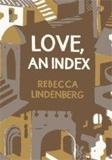September 25, 2012LOVE, AN INDEX
Review by Cory Andrews
McSweeny’s
849 Valencia St.
San Francisco, CA 94110
ISBN: 978-1-936365-79-1
2012, 96 pp., $18.00
www.mcsweeneys.net
“Poetry” is “how thought feels,” writes Rebecca Lindenberg in the poem “Love, An Index” in her book by the same name. Indeed, the poems that comprise this collection feel like thought, an associative web that reflects the manner in which human memory operates. Spurred by the disappearance of Lindenberg’s partner, Craig Arnold, in 2009, Love, An Index deftly navigates a temporally flexible landscape of grief, joy, and everything in between. A large portion of the book is in fact an index, or at least in the format of one, cataloguing memories, emotions, places, and physical objects along with an explanation of sorts of their importance.
The literal cross-referencing that takes places in this index contributes immensely to the associative quality of Lindenberg’s work—one would be hard-pressed to resist the urge to cross-reference throughout the entire book after reading entries such as “CONVERSATION” and “LOVE”:
CONVERSATION
…
poems held between two people “Lucky Pierre style.”
(See also: PERSONISM.) With Coleridge, “And when I rose
I found myself in prayer.” Such poems gather
everything into the now of the poem. I want
to gather everything into this poem’s now,
but can’t. All is gloss (See also: GLOSS).LOVE, what we call it when it keeps feeling that way.
But what is it? A private language? A motion
ever towards? A memory the body keeps
of those palms on my flank? And must it
be a kind of mourning? (See also: ATTENTION,
COMFORT, DIDO, HEART, JUST, X.)
If Lindenberg feels that she cannot gather everything in this poem’s now, she certainly manages to gather what seems like everything into the now of the entire book. The ever-corresponding qualities of the project give the work a sense of event, a cohesive arrangement of poems that resist a linear progression in favor of productive circularity–a constant and simultaneous pointing back, looking forward, and acknowledging of present.
The poem “Catalogue of Ephemera” is also a particularly apt lens through which to read Love, An Index. The poem emphasizes things themselves, or abstractions as things, that are given to the speaker: “You give me the swoop of homemade kites in the park on Sunday. / You give me afternoon-colored beer with lemons in it. // You give me D.H. Lawrence, / and he gives me pomegranates and sorb-apples.”
Objects seem to be Lindenberg’s anchor for memories, though memories themselves often appear, such as in the poem “Greek Easter”: “Bury me, your son / demands. Warm sand // leaves black dust / on our palms. We heap // his goosepimpled legs, / damp swimsuit, // soft belly, crossed arms.”
The temporal ambiguity of Lindenberg’s work is paid for, I think, by the work of conflating temporality with object. The anaphoric repetition of “You give” in “Catalogue of Ephemera” is immediate, but the sheer number of things given places the poem in the past—a significant amount of time must pass in order to acquire all of the items listed in the poem. The poem reads “You give” but the reader begins to hear “You gave,” lending the poem simultaneity of disparate temporal locations that can be traced through a web of memories and the objects that are those memories’ physical placeholders.
Such a tension is an example of Lindenberg’s ability to tweak the sense of time and place in her poems, wherein the memory is of something gone by but the act of remembering is immediate. That immediacy is the driving force behind an initial reaction to Lindenberg’s work. The reader is never confused, never unsure of the current location, because the back-and-forth nature of the book is so clear. That back-and-forth also hits home as an iteration of human memory, and we instantly recognize it.
In “Illuminating,” the you-figure of the poem says to the speaker after she’s lost her wallet, “What would want your wallet for anyway?” Indeed, the wallet carries importance as an object, but is indeed just an object, a placeholder for a something much more complicated that Love, An Index takes on as its subject.
One of the most poignant moments is the entry under “F” for “FRAGMENT”: “I am a fragment of us. I am a fragment composed / of fragments. Mosaic, pastiche, ruin. / … all associated. Parts suggesting the whole / they long to be gathered into.” The distinction between parts belonging to a whole and parts longing to be gathered as a whole reflects the nature of Lindenberg’s powerful project—the gravitational pull toward some hovering entity; the fragments are the individual objects, memories, places, and emotions which are indexed, gesturing to the mass they long to gather into–love.